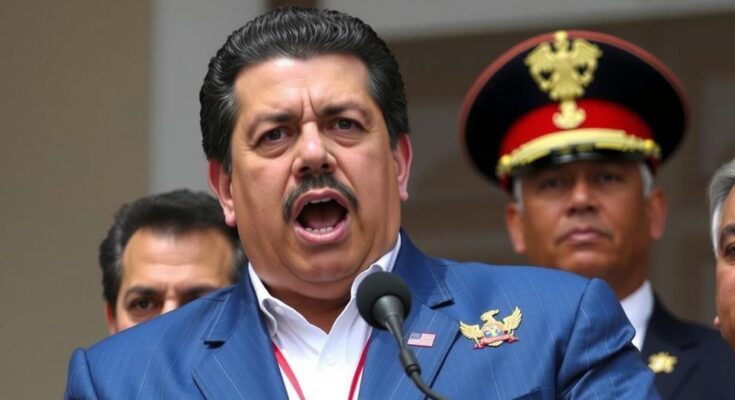Nicolas Maduro was sworn in for a third term as Venezuela’s president amid controversy over alleged electoral fraud, with opposition leader Edmundo Gonzalez claiming victory in a disputed election. Maduro faces strong opposition from both internal dissenters and international entities like the United States, which has issued sanctions and does not recognize his legitimacy. Protests have erupted following the election results, highlighting ongoing political instability in the country.
Nicolas Maduro has officially taken the oath for a third six-year term as President of Venezuela, following a contentious election that has been widely criticized for alleged voter fraud. His inauguration comes amidst ongoing disputes with the opposition and international condemnations led by the United States, which does not recognize his electoral victory, instead endorsing his rival Edmundo Gonzalez. Maduro expressed his commitment to fostering peace, prosperity, equality, and democracy in the nation, despite the turmoil surrounding his administration.
The recent election has further polarized the political landscape in Venezuela, with Maduro declaring a narrow win of 51 percent of the votes, while opposition figures have published results indicating that Gonzalez won by a significant margin. The opposition’s calls for transparency were met with a crackdown from the Maduro government, which has accused dissenters of colluding with foreign powers. Protests ignited following the election results, resulting in numerous arrests and casualties amid government repression.
Opposition leader Maria Corina Machado has emerged as a vocal opponent of Maduro, leading protests and facing temporary detention during demonstrations. Despite the government’s efforts to suppress opposition and dissent, Maduro’s administration persists in its assertion of legitimacy, intensifying political tensions within the country.
Venezuela’s political environment has been marked by ongoing disputes between the ruling party and opposition forces since Maduro assumed power following Hugo Chavez’ death in 2013. His tenure has faced significant criticism for authoritarian governance amid severe economic and political crises. With accusations of manipulating elections, Maduro has consistently maintained that his administration reflects the will of the people, although international observers, including the United States, contend otherwise. The recent elections held in July 2023 have further aggravated these divisions, offering a focal point for protests and international scrutiny, particularly from Western allies who advocate for democratic reforms in Venezuela.
In summary, Nicolas Maduro’s inauguration signals a continuation of a contentious and divisive political era in Venezuela, marked by allegations of electoral fraud and aggressive crackdowns on opposition voices. While Maduro pledges a commitment to peace and democratic governance, the opposition challenges this narrative, asserting that their rights and freedoms continue to be systematically repressed. As events unfold, the international community watches closely, and the potential for further unrest remains high as opposition groups seek to rally public sentiment against Maduro’s administration.
Original Source: www.aljazeera.com




